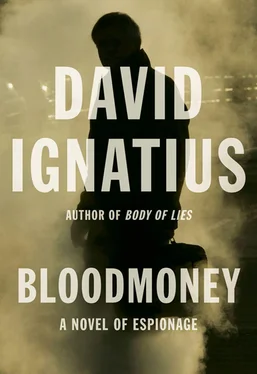David Ignatius - Bloodmoney
Здесь есть возможность читать онлайн «David Ignatius - Bloodmoney» весь текст электронной книги совершенно бесплатно (целиком полную версию без сокращений). В некоторых случаях можно слушать аудио, скачать через торрент в формате fb2 и присутствует краткое содержание. Жанр: Шпионский детектив, на английском языке. Описание произведения, (предисловие) а так же отзывы посетителей доступны на портале библиотеки ЛибКат.
- Название:Bloodmoney
- Автор:
- Жанр:
- Год:неизвестен
- ISBN:нет данных
- Рейтинг книги:4 / 5. Голосов: 1
-
Избранное:Добавить в избранное
- Отзывы:
-
Ваша оценка:
- 80
- 1
- 2
- 3
- 4
- 5
Bloodmoney: краткое содержание, описание и аннотация
Предлагаем к чтению аннотацию, описание, краткое содержание или предисловие (зависит от того, что написал сам автор книги «Bloodmoney»). Если вы не нашли необходимую информацию о книге — напишите в комментариях, мы постараемся отыскать её.
Bloodmoney — читать онлайн бесплатно полную книгу (весь текст) целиком
Ниже представлен текст книги, разбитый по страницам. Система сохранения места последней прочитанной страницы, позволяет с удобством читать онлайн бесплатно книгу «Bloodmoney», без необходимости каждый раз заново искать на чём Вы остановились. Поставьте закладку, и сможете в любой момент перейти на страницу, на которой закончили чтение.
Интервал:
Закладка:
The “system” that Perkins had constructed with the man he knew as Anthony Cronin was invisible, though it most assuredly was in place. It would have been impossible for an outsider to distinguish any special bits of information from the torrent that flowed in from the multiplicity of screens. That was why it was so lucrative. A slight advantage at the margin could produce a very large difference in outcome. If you knew for a certainty, say, that the Bank of China would be raising interest rates later in the next trading day, you could make a great deal of money. But most people assumed that sort of trading advantage was impossible: You would need to have your own spy within the Chinese bank, or a hidden microphone, or a code break that allowed you to read their encrypted communications. No private trader could hope to do any of that; but someone who had government help…that was a different matter.
Perkins rose from his desk and moved to the conference table. He introduced his team of analysts to the new tryout on the energy desk, Sophie Marx. She was appropriately nervous. She had spent a day preparing for the meeting, tutored by Jeffrey Gertz, who wanted her to make a splash her first day. She still wasn’t sure she could pull it off; mercifully, she didn’t have to go first.
Marx looked at her notes. Gertz had arranged for her to do some quick “energy research” with Janko Spellman, a Serbian with a shaved head and big ears who had been a CIA asset during the Kosovo War. He traveled Eastern Europe now, picking up information for Gertz as if it were so much lint on a blue serge suit. He had just returned from a particularly useful trip to Ukraine.
“Talk to Janko,” Gertz had said. “He has the goodies.”
“I don’t like this,” Marx had answered.
“Too late for that. Second-guessing is for losers.”
And he was right. If you wanted a job where you only did things you knew were right, you should look for another line of work.
Perkins clanged his water glass with his pen as if it were the opening bell on Wall Street; it was time to make some money.
“What’s happening in the debt markets?” he began. “It feels like time to sell anything French. Banks are weak, GDP growth is weak. Their bonds haven’t been downgraded yet, but I bet they will be soon. Sell France. Am I right, Fiona?”
Perkins turned to a British woman in her mid-thirties, who was one of his banking analysts. Fiona was wearing thick glasses, and her hair was in a bun. She looked ferocious.
“ La chute,” she said. “The spread between LIBOR and the French interbank rate has been widening for a week. But the market is confused. The spread was forty basis points as of this morning, down five basis points from yesterday.”
“Confused.” Perkins repeated the analyst’s comment with relish, for this was his favorite of all possible market conditions. “People are assuming that the Germans are coming to the rescue. But they aren’t. Why should they clean up France’s mess? They aren’t weaklings, like Greece and Portugal, they’re supposed to be coequals. The French spreads are going to widen. Go tell Cameron we want to short every debt or equity issue that says France. Will you do that? Right now, please.”
Fiona scrambled out of Perkins’s office onto the trading floor, where she found Cameron Cummings, the lead trader in Eurozone markets. He wore blue-framed glasses, which made him look like a model in Men’s Vogue. But he was a killer, like most of the people on the floor.
While Fiona was relaying the boss’s orders, Perkins had thought of a further refinement. He pushed a button on a microphone in front of him, which activated the squawk box; he punched two more buttons, so he was connected directly with Cameron’s desk.
“Do this carefully, please. Don’t scare the market. Do it in small bites this morning, not all at once, so the dealers don’t get it. If people see what we’re doing, they will all want to sell. Can you use a cutout, Cameron?”
“Morgan Stanley owes me. They’ll do the first fifty bucks on their account,” said the man who managed the Euro debt portfolio.
“Brilliant.” Perkins disengaged the squawk box and turned back to his market strategists. “What do we know about the ECB, Dominic? Anything new?”
Dominic Caprezzi, the balding, well-fed analyst who followed the European Central Bank, spoke up.
“I met last week with George Paternoster, the deputy chief economist at the ECB. He didn’t exactly say so, but I think they’re going to start tightening again.”
Perkins shook his head. “Paternoster is getting fired. I have it on good authority. I meant to tell you. What about the German yield curve? Did he say anything about that?”
Heads nodded around the table. German interest rates were one of the big market plays in hedge-fund land right now. Short-term rates had gone up so much recently that the curve was flattening. Many traders were betting that long rates would begin to rise, too, to restore the traditional upward-sloping curve.
“Long rates have to rise,” said Dominic, echoing the conventional wisdom. He got a bit pedantic at that point, reminding everyone that higher long yields were rational, and thus inevitable, because they were the commensurate reward for the risk of holding money for a longer period.
“Nope,” said Perkins, cutting him off. “It’s not going to happen. Here’s the narrative: Flat yield curve; ECB happy with it; wants long-term rates low. End of story. Our bet is a flat yield curve.”
“Are you sure?” asked Dominic warily. Perkins encouraged his analysts to challenge him, though they were never convinced he meant it.
“That is an epistemological question, which I cannot answer. What is certainty? But I think I’m right. And that’s enough.”
He got on the squawk box and called for Cameron again. “Watch your Eurobond maturities, please. And keep buying at these prices, even if everyone else is selling. They’re wrong.”
Perkins turned to Sophie Marx. She had been watching this drill with intense interest-not simply in appreciation of how finely the instrument was tuned, but because she was curious where the information came from: How much was normal market intelligence, how much was guesswork and how much was secret information-telephone and email intercepts, or well-placed agents inside central banks-that had been acquired by U.S. intelligence and passed on to Perkins? It was impossible to know, and that was the point.
“Do you have anything for us, Miss Marx?” he asked. “You’re the new kid, but don’t be bashful.”
“I do have a little something.” She smiled coyly. These people didn’t know her. She was the tryout.
“Delicious. Tell the class, please.” The Pacman’s mouth was open, ready to chomp another new asset before it was time for lunch.
“This would be a good time to buy oil and gas in the commodities markets, raw stocks and futures both.” She spoke slowly in a voice that quavered slightly with the anxiety and uncertainty that a newcomer would feel.
“Do you think so?”
“Yes, sir, and it would also be a good time to short the stocks of Russian oil and gas companies and any foreign majors that market Russian supplies.”
“And why is that?” asked Perkins. She hadn’t briefed him in advance, and he was genuinely curious. “Most people have been going the other way. They think energy prices have peaked for a while. And they like the Russians. Why do you think different?”
“The Russians have pipeline problems.” She spoke so quietly that people at the far end of the table had trouble hearing her.
“Is that so? Well, I haven’t heard anything about them. And I follow the energy market pretty closely.”
“It’s not really public yet, Mr. Perkins. But there was a rupture of the Russian gas pipeline in western Ukraine two days ago. They shut it down yesterday, and it’s going to take quite a while to fix. I think.”
Читать дальшеИнтервал:
Закладка:
Похожие книги на «Bloodmoney»
Представляем Вашему вниманию похожие книги на «Bloodmoney» списком для выбора. Мы отобрали схожую по названию и смыслу литературу в надежде предоставить читателям больше вариантов отыскать новые, интересные, ещё непрочитанные произведения.
Обсуждение, отзывы о книге «Bloodmoney» и просто собственные мнения читателей. Оставьте ваши комментарии, напишите, что Вы думаете о произведении, его смысле или главных героях. Укажите что конкретно понравилось, а что нет, и почему Вы так считаете.












